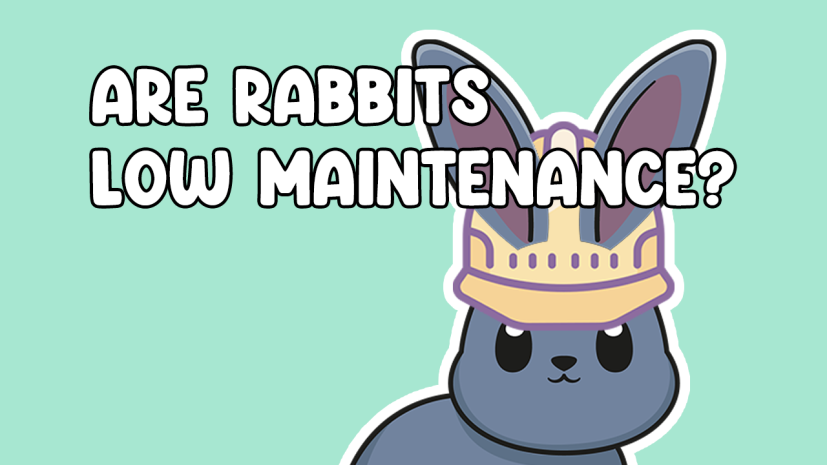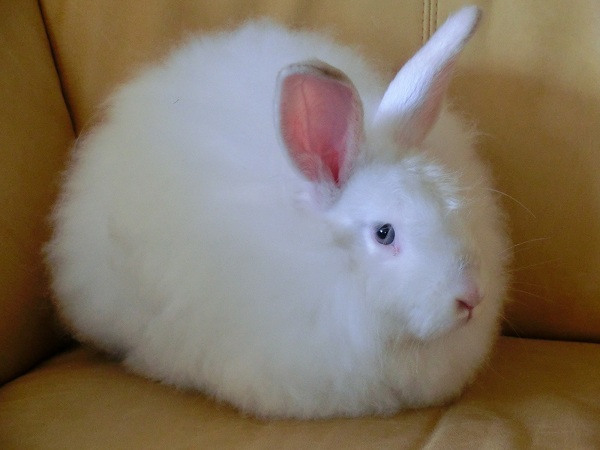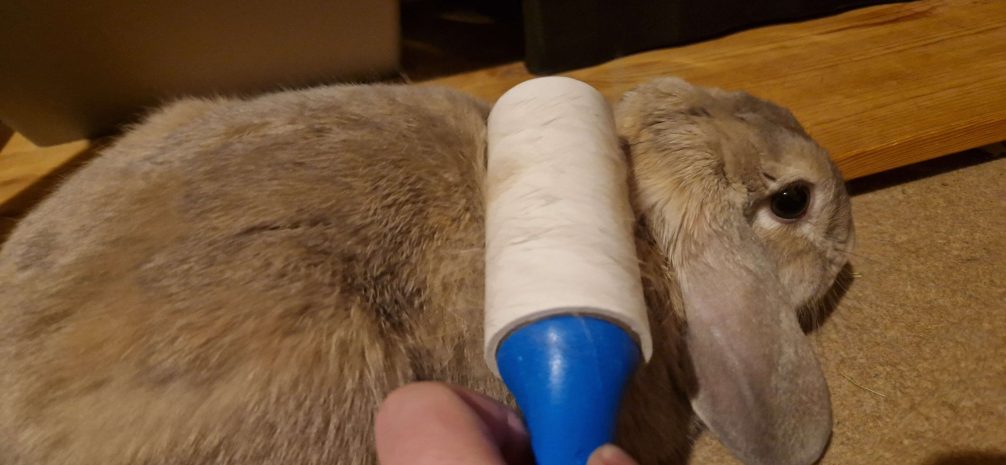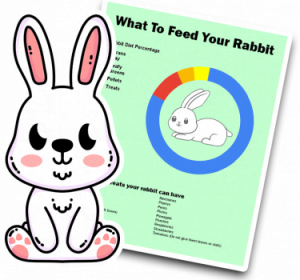
Rabbits are adorable and charming creatures that have captured the hearts of many as popular pets, especially during the easter period. However, there is often confusion surrounding the level of maintenance required to care for a domestic rabbit. By dispelling myths and offering practical insights, we aim to equip prospective and current rabbit owners with the knowledge to provide the best care possible.
The belief that rabbits are low-maintenance pets is a common misconception. Some people might assume that because rabbits are small and caged animals, they require minimal effort to care for. However, this perception is far from accurate.
A rabbit must be kept in sufficient spacing and have time daily to exercise. If you can, we highly recommend keeping your rabbit entirely free to roam, as this will keep them extremely happy and increase your bond with your bunny.
If you haven’t already, we suggest reading our full rabbit care guidance, which covers everything a new rabbit owner will need to start preparing for a rabbit!
A balanced diet consisting of hay, fresh vegetables, and rabbit pellets is essential for their digestive health. Secondly, rabbits need ample space to hop, jump, and play. They require a spacious living area with opportunities for exercise and exploration. Regular supervised playtime outside of their enclosure is vital for their physical and mental health.

Additionally, just like any other pet, rabbits need routine veterinary check-ups to prevent and address health issues. Neglecting their healthcare can lead to significant problems down the line.
Another essential element is their living environment. Rabbits require a spacious and enriching enclosure with hiding spots, toys, and chewable items to stimulate their minds. A cramped or boring living space can lead to stress and unhappiness in these social animals.
Rabbits are also prone to dental issues, which makes chewing vital for their dental health. Providing appropriate chew toys and safe items for them to gnaw on is crucial to prevent dental problems.
Social interaction is also an integral part of rabbit maintenance. Rabbits are social animals that form strong bonds with their owners. Spending quality time with them, petting, playing, and even talking to them, helps to build trust and a strong connection.
Lastly, grooming is a significant aspect of rabbit care, particularly for long-haired breeds like Angoras. Regular grooming is necessary to prevent fur matting and to keep their coats clean and healthy.
Rabbits have unique characteristics that make them endearing companions. They are social animals that enjoy interaction and playtime with their human family members. Furthermore, rabbits can form strong bonds with their owners and other pets in a household, making them highly affectionate pets.
We believe a shorter-haired rabbit like a Netherland Dwarf or Mini Rex is likely the easiest popular breed of rabbit to look after. However, different breeds of rabbits exhibit distinct traits, from small and fluffy to larger and more robust varieties, allowing potential owners to choose the perfect fit for their lifestyle, much like cats and dogs.

The Netherland Dwarf is one of the tiniest rabbit breeds, known for its compact size and adorable appearance. These tiny bunnies typically weigh around 2 pounds and have a rounded face with big, expressive eyes. They come in various colors and patterns, making them a delight to look at.
Personality: Despite their small size, Netherland Dwarfs are full of energy and personality. They are playful, and curious, and enjoy hopping around their living space. While they can be affectionate, they may also have an independent streak.
Special Considerations: Due to their small size, Netherland Dwarfs are delicate and require gentle handling. They might not be the best choice for households with young children who might accidentally mishandle them.

The Lionhead rabbit breed is easily recognizable by its distinctive mane-like fur surrounding its head, resembling the mane of a lion. They are medium-sized rabbits with compact bodies and fluffy fur.
Personality: Lionheads are known for their friendly and docile nature. They tend to be social and enjoy interacting with their human companions. Their gentle disposition makes them great pets for families.
Special Considerations: The long fur around their head requires regular grooming to prevent matting and tangles. Additionally, Lionheads may be prone to dental issues, so providing appropriate chew toys and a balanced diet is crucial.

The Flemish Giant is one of the largest domestic rabbit breeds, weighing in at around 14 pounds or more. Despite their size, they are surprisingly gentle and have a calm demeanor.
Personality: Flemish Giants are known for their laid-back and friendly personalities. They are generally good-natured and enjoy being petted and cuddled. Their size can make them appear intimidating, but they are gentle giants.
Special Considerations: Due to their substantial size, Flemish Giants require a more spacious living area and larger food portions than smaller breeds. Regular exercise is essential to keep them healthy and prevent obesity.

The Holland Lop is a popular breed characterized by its adorable floppy ears and compact size. They have a gentle and sweet expression, making them incredibly endearing.
Personality: Holland Lops are affectionate and enjoy being around people. They have a playful and curious nature, and their charming appearance adds to their appeal.
Special Considerations: Due to their droopy ears, they may be more prone to ear infections, so regular ear cleaning and care are necessary. Providing ample chew toys is also important to keep their teeth healthy.

The Mini Rex is a small-sized breed with a velvety soft coat that resembles plush velvet. They have a compact, rounded body and a friendly, inquisitive expression.
Personality: Mini Rex rabbits are known for their friendly and outgoing personalities. They are intelligent and can be trained to do tricks or follow commands.
Special Considerations: Their short, dense fur requires minimal grooming compared to long-haired breeds. However, they may shed occasionally, so regular brushing is still recommended.

Angora rabbits are famous for their luxurious long fur, which requires regular grooming to keep it in top condition. They come in various colors and have a graceful and elegant appearance.
Personality: Angoras are generally gentle and sociable, although individual personalities may vary. They enjoy attention but may need patience during grooming sessions.
Special Considerations: Regular and thorough grooming is essential for Angora rabbits to prevent matting and keep their fur clean and healthy. Their grooming routine requires commitment and dedication.
Compared to some other pets, rabbits do require a higher level of care and attention. Understanding these needs is crucial for responsible pet ownership.
One of the significant aspects that contribute to rabbit maintenance is exercise. Rabbits need ample space to hop and run around. Daily exercise is essential to prevent obesity and maintain their physical health.
Furthermore, rabbits have a natural instinct to chew, which is vital for wearing down their teeth and preventing dental issues. Providing appropriate chew toys is necessary to satisfy this need and promote dental health.

Litter box training is another essential aspect of rabbit care. Proper litter box training is crucial to maintain a clean and odor-free living space for both the rabbit and its owner. Thankfully, rabbits are usually receptive to litter box training with some patience and consistency.
Lastly, gentle handling is essential for rabbits. They may become stressed if mishandled or frightened. Taking the time to handle them with care and respect will create a positive and trusting relationship.
Although rabbits require a certain level of care, some aspects can be considered low maintenance compared to other pets.
For example, rabbits are relatively independent pets. They can entertain themselves when provided with enough toys and stimulation. However, they still require daily social interaction and attention from their owners.
We find that our rabbit is happy in our company when we work from home, just sitting in the living room and sleeping.
Additionally, with patience and positive reinforcement, rabbits can be trained to follow basic commands and use a litter box. Proper training can make aspects of rabbit care more manageable.
Furthermore, short-haired rabbit breeds like Mini Rex require less grooming compared to long-haired breeds like Angoras. While regular brushing is still necessary, the grooming routine is generally less time-consuming.
Taking care of rabbits can be a delightful experience with the right approach and resources! We absolutely love being a rabbit owner. Here’s some tips we’ve picked up over the last few years for making caring for your rabbit easier:
When comparing rabbits to dogs, it’s important to consider that both animals have unique care requirements and maintenance levels. While rabbits have certain aspects that can be considered less maintenance than dogs, they also have specific needs that must be met.
Rabbits generally require less exercise than dogs. Dogs, especially active breeds, need regular walks and playtime to burn off energy and stay physically fit. On the other hand, rabbits can get sufficient exercise through supervised playtime outside their enclosures. While rabbits need exercise to prevent obesity and maintain their health, it is generally less time-consuming than daily walks for dogs.
In terms of grooming, rabbits can be both less and more maintenance than dogs, depending on their breed. Short-haired rabbit breeds, like Mini Rex, may require less grooming than dogs, as their coats are relatively easy to manage.
However, long-haired rabbit breeds, like Angoras, demand more grooming to prevent fur matting and maintain their coat health. In comparison, dog grooming varies widely depending on the breed, with some needing frequent brushing and others requiring professional grooming.

When it comes to litter training, rabbits can be litter box trained, making cleaning up after them more manageable. Dogs, on the other hand, require consistent potty training, which can be time-consuming and may involve accidents during the training process.
Rabbits are generally smaller than most dogs, which means they require less space in the living area. This can make them a more suitable option for people living in apartments or with limited space. Dogs, especially larger breeds, may need more room to roam and play.
While both rabbits and dogs require specific diets, rabbits have more straightforward dietary needs. They are herbivores and primarily eat hay, vegetables, and pellets. Dogs, on the other hand, require a balanced diet that can include a variety of meats, vegetables, and grains.
Rabbits can live 8 to 12 years with proper care and attention.
Yes, rabbits can be litter box trained with patience and consistency.
While rabbits can be great pets for gentle and responsible children, adult supervision is necessary to ensure the rabbit’s safety.

By entering your email address you agree to receive emails from Cottontailclub. We'll respect your privacy and you can unsubscribe at any time.